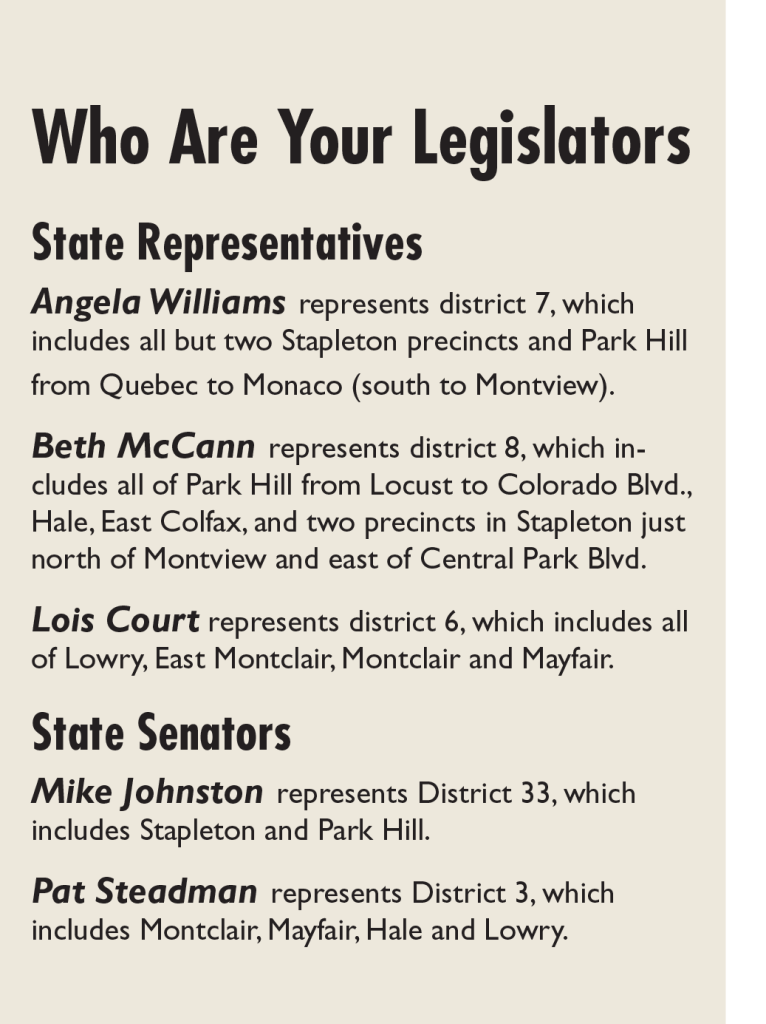
Legislators left to right: State Rep. Angela Williams (distr. 7), State Rep. Beth McCann (distr. 8), State Rep. Lois Court (distr. 6), State Sen. Mike Johnston (distr. 33) and State Sen. Pat Steadman (distr. 3).
The Front Porch asked the five legislators who represent our distribution area to share their thoughts on the most important bills they hope will get passed this legislative session.
Every year, the biggest bill they have to pass is the state budget. After the lean years of the recession when cuts were made in many areas, legislators this year are optimistic about the slow and steady growth in the economy and tax revenue collections that are enabling them to think about programs to fund rather than focusing so much energy on decisions about cuts.
K-12 Education
All five legislators listed education as one of their top priorities. Education is 35% of the state budget, the single biggest expenditure—about $8-9 billion. There are two main components to funding education, the basic per pupil funding required by law, which Sen. Pat Steadman is working on, and additional funding for education in specific areas.
 After the failure of Amendment 66 on the last ballot, Sen. Johnston is sponsoring the $303-million Student Success Act to provide revenue for some of the priorities that were identified in Amendment 66, including funds for: helping districts recover from the years of cuts (which will help restore some of the athletics, music and arts programs); addressing the needs of struggling readers; charter facilities; English Language Learners; kindergarten facilities; and technology.
After the failure of Amendment 66 on the last ballot, Sen. Johnston is sponsoring the $303-million Student Success Act to provide revenue for some of the priorities that were identified in Amendment 66, including funds for: helping districts recover from the years of cuts (which will help restore some of the athletics, music and arts programs); addressing the needs of struggling readers; charter facilities; English Language Learners; kindergarten facilities; and technology.
$100 million of the above bill is proposed as a one-time expenditure for implementation of assessments, evaluations, technology and school safety as well as additional funding on a per pupil basis.
$15 million of the bill is proposed as a one time expenditure to improve transparency and reward schools that enroll students after the count date. Currently schools that enroll new students after the single day count in the fall suffer from not being funded for those students. The bill proposes to create a data collection system for tracking average daily attendance throughout the year, with phase in and testing the system for several years before changing over to funding based on average daily attendance.
Higher Education
After years of cuts to higher education, several of our legislators talked about the importance of making college more affordable. A bill has passed the Senate Education Committee to put $100 million into higher education for scholarships and increase the amount of direct funding
students take with them to a state college by $1,000. Efforts are also being made to put a cap on tuition hikes.
The Economy
Tax on Internet sales—Rep. Court and Sen. Johnston point out that it is unfair to Colorado businesses who pay property and sales tax that Internet businesses with no physical
presence in the state don’t pay Colorado tax. They were hopeful that Colorado could start collecting state sales tax on Internet sales, but a Denver judge has, at least temporarily, stopped the state from enforcing the 2010 Colorado law to collect those taxes. That law was challenged in court by a trade organization representing businesses.
Broadband for rural areas—Colorado has had a fee on phone bills that creates a $55 million/year fund to subsidize construction of phone lines to rural parts of the state. Today Internet is the crucial technology that will allow rural parts of the state to run businesses, have better access to health care and improve educational opportunities. Rep. Williams and Sen. Johnston are working on a bill that will designate a fund for broadband rather than phone lines to be built with that fund to help improve the economy in rural areas.
Tax credits—Tax credits come in many forms, some benefitting businesses, some benefitting individuals, some benefitting specific groups like historic preservation. Sen. Steadman points out the importance of looking at the big picture on tax policy in the state, not just looking at these bills one by one.
Several of our legislators pointed out that child care credits not only benefit families, they are also a big economic stimulus. Families that qualify for tax credits immediately put that money right back into the economy for daily expenses.
Rep. Williams points out the benefits of the advanced industries program to bring aerospace, manufacturing and energy businesses to the state. To help small businesses she is working on a bill that will give a credit for taxes owed on the first $25,000 in business personal property.
State infrastructure—One time expenditures to improve state infrastructure can give a boost to the economy without adding an ongoing expense to the state budget. Construction on college campuses, state buildings and development of new computer systems all provide an economic stimulus.
Sen. Steadman describes a major project to modernize the statewide computer system of the Department of Motor Vehicles. The current system is 30 years old and only runs 84% of the time so many residents arrive to get a license or plates and find a note that the system is down. Today wait times average an hour—the new system should reduce wait times to 15 minutes.
Health
Rep. McCann is working on a bill that will improve prescription drug monitoring. Nationally more people die from prescription drug overdoses than traffic accidents and Colorado is the second highest in reported prescription drug misuse. She is proposing a bill that requires those who write and fill prescriptions for narcotic drugs to register in a database, though, data entry will be voluntary. Other states have found that similar voluntary systems have been successful in tracking misuse of prescription drugs.
Rep. McCann is proposing a bill to prohibit tobacco sales to those under 18 years. Because many people start smoking young, then spend years trying to quit, she hopes this bill will prevent some young people from starting.
Rep. McCann is also sponsoring a bill that would allow emergency responders to stabilize a pet until they can be taken to a vet. They currently don’t have the authority to do that.
An additional health bill by Rep. McCann calls for setting up a state commission on how to control health care costs.
Consumer Protections
Reps. Williams and McCann both continue to work on foreclosure issues. One bill requires that any overpayments made by consumers as they deal with foreclosures must be returned to the consumer, not kept by the lender. Another bill gives consumers an additional 90 days to work with the lender to avoid foreclosure.



0 Comments